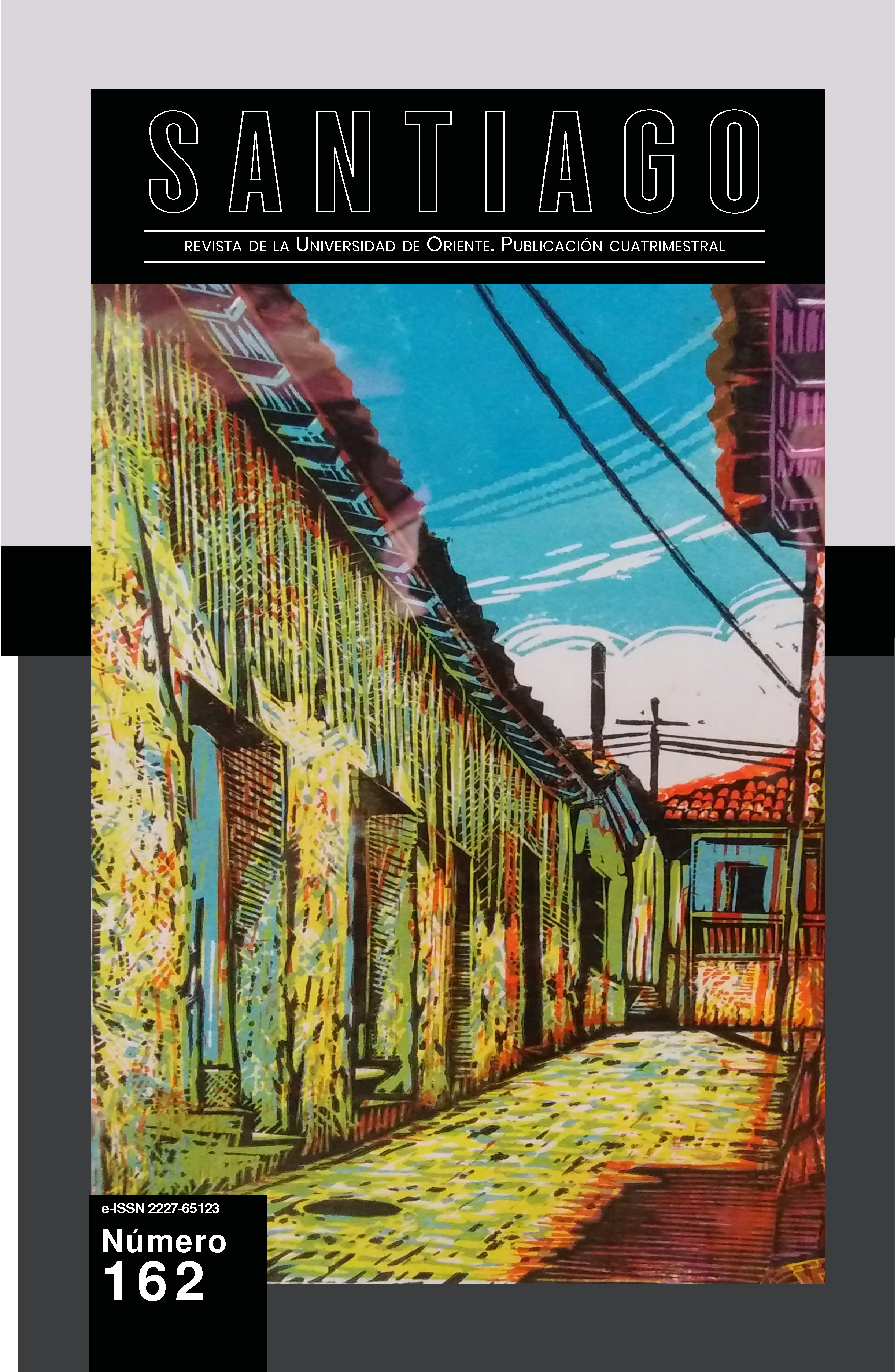Proceso de formación doctoral: descubriendo sus características internas
Palavras-chave:
formación doctoral, proceso de formación doctoral, características del proceso de formación doctoral, aprendizaje de doctorandosResumo
El artículo presenta una reflexión sobre factores que inciden en el proceso de formación doctoral y las insuficiencias tratadas en publicaciones actualizadas y el dominio de la autora. Los hallazgos resultan de la aplicación de los métodos inductivo deductivo y analítico sintético para determinar aspectos esenciales vinculados a la percepción de los contenidos internos de dicho proceso. Los resultados muestran una caracterización de su significado para el crecimiento de los doctorandos y las características menos visibles del mismo. Además, se aportan contenidos vinculados a las exigencias en la formación del doctorando y el tipo de aprendizaje que exige dicha formación.
Referências
Alarcón, M. A., Alarcón, H., & Venturo, C. O. (2015). Obstáculos epistemológicos en la tesis doctoral: un estudio en la Universidad Nacional de
Educación-Perú. III Seminario Internacional de Representacoes Sociais. Educasao, 26-29/10/2015.
Álvarez, A.C. & Álvarez, V. (2011). Formación de investigadores educativos y
eticidad. Revista Iberoamericana sobre calidad, Eficacia y cambio en
Educación. REICE, 9 (2), 97-104. http://www.rinace.net/reice/numeros/arts/vol9num2/art06.pdf
Bamgboje, A., Ye, M., Almond, H. & Sakulwichilsintu. (2016). Inside the
Minds of Doctoral Students: Invetigating Challenges in Theory and
Practice. International Journal of Doctoral Studies, 11, 243-267. http://w.informingsciences.org/Publication/3542
Baptista, A.V. & Huet, I. (2012). Making Sense of Metaphors about Doctoral Students’ Competence: Analysis of Supervisors´ Voices. Procedia – Social and Behavioral Sciences, 47, 930-937. doi: 10.1016/j.sbspro.2012.06.759
Bermúdez, J. C., Morales, P de los A. & García, J. C. (2018). Claves epistemológicas para la formación de investigadores educativos. INNOVA Research Journal, 3 (2), 83-98. ISSN 277-9024. https://doi.org/10.33890/
innova.v3.n2.2018.414
Brailsford, I. (2010). Motives and Aspirations for Doctoral Study: Careers,
Personal, and Interpersonal Factors in the Decision to Embark in History PhD. International Journal of Doctoral Studies, 5, 15-27. link.gale.
com/apps/doc/A251277848/AONE? u=anon~9338db7a & sid=bookmark-AONE&xid=8707eccf
Burford, J. (2017). Conceptualising Doctoral Writing as an Affective-Polítical
Practice. International Journal of Doctoral Studies, 12, 17-32. http://
www.informingscience.org/Publications/3689
Cravens, A., Ulibani, N., Cornelius, M., Royalty, A., & Nabergaj, A. (2014).
Reflecting, Iterating and Tolerating Ambigüity: Highlighting the Creative Process of Scientific and Scholarly Research for Doctoral Education. International Journal of Doctoral Studies, 9, 229-247. http://ijds.
org/Volume9/IJDSv9p229-247Cravens0637pdf.
Corner, S., Lofstrom & Pyhalto, K. (2017). The Relationships Between Doctoral Students’ Perceptions of Supervision and Burnout. International
Journal of Doctoral Studies, 12. 91-106. http://www.informingscience.
org/Publications/3754
Devos, C., Boudrenghien, G., Van der Linden, N., Frenay, M., Azzi, A.,
Galand, B., & Klein, O. (2016). Misfits between doctoral students and
their supervisors: (How) Are they regulated? International Journal of
Doctoral Studies, 11, 467-486. http://www.informingscience.org/Publications/3621
Fernández, L. (2018). Pedagogía de la formación doctoral. UAI Editorial,
Teseo, 240 p. ISBN 978-987-723-170-0
Fernández, L. & Wainerman, C. (2015). La dirección de tesis de doctorado
¿una práctica pedagógica? Perfiles Educativos, 27(148), 156-171. http://
www.scielo.org.mx/scielo.php?pid=S018526982015000200010&script=sci_abstract&tlng=pt
Gardner, S, Jansujwicz, J., Hutchins, K., Cline, B & Levesque, V. (2012). Interdisciplinary Doctoral Student Socialization. International Journal of
Doctoral Studies, 7, 377-394. https://doi.org/10.28945/1743
González, D. E. (2015). Concepción sobre la formación de investigadores.
Aproximaciones hacia un Estado del Arte. 3er Congreso Internacional
de Investigación Educativa. Educación y Globalización. INIE. Costa
Rica .3-5 febrero https://inie.ucr.ac.cr/congreso
Ha Choi, Bouiwma-Gearhart & Ermis. (2021). Doctoral Students Identity Developement as Sccholars in the Education Sciences: Literature
Rewiew and Implications. International Journal of Doctoral Studies,
, 89-125. https://doi.org/10.28945/4687/(CC BY- NC 40)
Hunter, K. & Devine, K. (2016). Doctoral Students Emotional Exhaution
and Intentions to Leave Academia. International Journal of Doctoral
Studies, 11. 35-61.http://ijds.org/Volume11/IJDSv//p035-061Hunter2198.pdf
Lynch, M.F., Salikhova, N. R. & Salikhova, A. (2018). Internal Motivation
among Doctoral Students: Contributions From the Student and From
the Students’ Enviroment. International Journal of Doctoral Studies,
, 255-272. htts://doi.org/10.28945/4091
Madrigal, R. (2017). La evaluación del doctorado. Tensiones y retos derivados
del eje: El doctorado del ISCEEM y los egresados. XIV Congreso Nacional de Investigación Educativa. COMIE. San Luis de Potosí. 1-9.
Mancoksky, V. (2009). ¿Qué se espera de una tesis de doctorado? Breve introducción sobre algunas cuestiones y expectativas en la formación
doctoral. RAES Revista Argentina de Educación Superior, Año 1 (1),
-216. https://www.untref.edu.ar/raes/documentos/Que%20se%20
espera%20de%20una%20tesis%20de%20doctorado.pdf
Nutov, L. & Hazzan, O. (2011). Feeling the Doctorate: Is Doctoral Research
that Studies the Emotional Labor of Doctoral Student Possible? International Journal of Doctoral Studies, 6, 19-32. file:///C:/Users/cepes/
Downloads/IJDSv6p019-032Nutov307.pdf
Ocampo, D. (2020). Estrategia neurodidáctica para la formación de investigadores sociales. INICC-Perú, 3(33) DOI: https://doi,org/10.3.6996/
delectus
Ortiz, E. (2019). La calidad de la formación de doctores en Ciencias Pedagógicas: una evaluación desde sus egresados y propuestas de mejora.
Revista Educación, 43 (1). https://www.scielo.sa.cr/scielo.php?pid=S2215-26442019000100001&script=sci_arttext
Padilla, C. (2019). Escritura epistémico-argumentativa e identidad académica
en estudiantes doctorales de Humanidades: Trayectorias previas, revisión colaborativa y perfiles de escritor. Traslaciones. Revista Latinoamericana De Lectura Y Escritura, 6(11), 86–115. https://revistas.uncu.
edu.ar/ojs/index.php/traslaciones/article/view/2000
Pyhalto, K., Vekkaila, J.& Keskinen, J. (2012). Exploring the Fit between
Doctoral Students’ and Supervisors’ Perceptions of Resources and
Challenges vis-à-vis the Doctoral Journey. International Journal of
Doctoral Studies, 7, 395 – 414. https://doi.org/10.28945/1745
Wainerman, C. (2011). Formación de investigadores. Ponencia XII Encuentro del estado de la investigación educativa. Facultad de Educación,
Universidad Católica de Córdoba, 22-23 sept, 2-9. http://revistas.bibdigital.uccor.edu.ar/index.php/adiv/article/view/3696/2400
Downloads
Publicado
Edição
Seção
Licença
Copyright (c) 2024 Berta Margarita González-Rivero

Este trabalho está licenciado sob uma licença Creative Commons Attribution-NonCommercial-NoDerivatives 4.0 International License.
CC Reconocimiento-NoComercial-SinObrasDerivadas 4.0





.jpg)
















